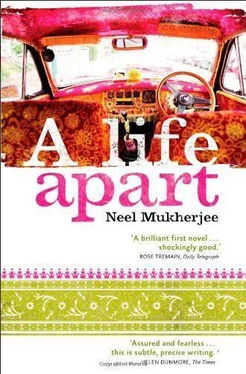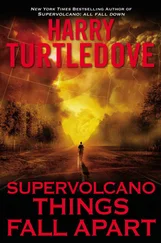There is a message next to the phone in the living room one day: ‘Gavin called’. When he asks Anne if Gavin had left a number, she says no. There is no way he can get in touch with him. But he has figured out a way to send letters to Aritra. He writes to his brother and asks him to address his envelopes to Anne Cameron, without any mention of his name anywhere in case the immigration people trace him back to Ganymede Road and throw him out of the country. Of course, he doesn’t mention the reason for this subterfuge to Aritra and fobs him off with a lie about bureaucracy and quirky rules of the British postal system.
Zafar doesn’t call or write. Ritwik doesn’t dare to call Saeed and ask for information about him: he doesn’t want Saeed to get the faintest whiff of himself as either a pining or a nosey rent boy. Of one thing he is certain — Zafar has lied to his handyman or has evaded the entire issue. The questions, double-guessings, doubts, all paralyse Ritwik and keep him from getting in touch with Saeed. Then three weeks after his first four hundred pounds, he calls Saeed again.
‘My friend,’ says Saeed, ‘you need more money, I give you.’
In a split second Ritwik decides to say yes because he can use their meeting for news of Zafar. ‘Why don’t we meet at Al-Shami?’
‘I too busy now, this week, next week. You meet me this night, Marble Arch tube, I give money, OK?’
‘No, wait, Saeed, I just wanted to ask if you had any news of Zafar.’ The question is phrased wrongly and Ritwik regrets his haste.
There is a pause before Saeed replies, ‘OK, everything OK. You don’t have news of Sheikh?’
Forced into this strategic ping-pong again, he tries to lob the question back to Saeed. ‘Is he in Saudi Arabia?’
‘Saudi Arabia?’ The disbelieving tone is followed by a long pause. ‘No, Sheikh in many countries. He travels now, business travel, lot of business travel. Africa, Sudan, Syria, Paris.’ Another pause. ‘I not know where Sheikh now.’
Ritwik swallows the flat contradictions and the seamless jumps between all those seemingly irreconcilable points on the map. A new question rears its dark head: is Saeed Zafar’s eyes in London?
Saeed marks the silence and asks Ritwik, ‘You in trouble, my friend? You need help?’
Ritwik says, somewhat more sharply than he intended, ‘No, what do you mean by trouble? What sort of trouble?’
‘No, my friend, I just ask. Your voice is. . how you say. . far, your voice is far, you know?’
‘I’m fine. I’ll come and pick the money up. What time is good for you?’
Slightly over three weeks after Saeed gives Ritwik his second installment, Zafar calls him to say he is in London for ten days; would tomorrow evening — late, say around half ten — be good for him, same place, Dorchester, that is, and then he could drive Ritwik to his new house. Ritwik says yes politely, with a slight tinge of formality, even; in this gradual illumination of someone else’s life, the words ‘new house’ hold a little corner of surprise. The question why Zafar chooses to stay in a luxury hotel if he has a house in this country is not asked, of course.
It is well past midnight when Zafar and Ritwik set out on the drive to Surrey. Zafar tells him the name of the village — Hincksey Green — and promises to take him back to Brixton before three. Ritwik sits in the car, the metallic taste of Zafar’s semen still in his mouth, and feels anxious about Anne, left alone in the house. When asked about what he did while he was away from London — did he see his wife, his children, what about the son whom he had mentioned last time — Zafar brushes the questions aside with a curt and condescending ‘Oh, the usual stuff, boring, don’t bother your pretty little head with it.’
Ritwik lets the first half an hour of the drive soothe the rage this condescension fires in him. Halfway through it, he asks, in a tone slightly more highly pitched than normal, ‘But, Zafar, you cannot forever evade such questions. It’s not just empty formality. I might be genuinely interested in your life elsewhere. I know practically zilch about it.’
Zafar gives his irritating, non-committal laugh. ‘That’s even scarier than empty formality.’
It is meant to be half a joke but the other half goes through Ritwik like a blade. He stares out of the window, watching the deserted, orange-lit suburbs of south London slip by smoothly and fast. He rolls down his window and a rush of cool night air, smelling of petrol fumes, grass and night vegetation, blows in. There are a lot of trees, green spaces and gardens where they drive through. After Peaslake, Ritwik loses interest in keeping track of places; he certainly doesn’t want to keep on asking Zafar where they are. The houses thin out after a while. Ritwik feels Zafar’s hand on his thigh and the tension in the car begins to fade away with his drowsiness. The cool air makes him shiver a bit so he rolls up the window.
‘Don’t you think there’s something reductive in associating every Arab man you meet with oil?’
More than this abrupt fracture of the nearly companionable silence Ritwik is jolted by the meditated and carefully studied quality of the question.
‘I don’t meet Arab men,’ he answers, as indirectional and evasive as Zafar.
‘But it was one of the first things you asked me, did I have anything to do with oil,’ Zafar insists.
‘Well. . you said. . you said you were from Saudi Arabia and. . and. .’
‘And so, with charming stereotyping impulses, you thought, ah, Saudi Arabia, therefore, oil.’
‘Well, you’re not wrong. I was being a bit. . insular,’ Ritwik says, very sheepish now.
Zafar returns his hand to his thigh and gives it a squeeze. ‘My father made his fortune in oil. But it’s not going to last forever.’
‘What, the oil or the fortune?’
‘Neither. Do you know anything about Saudi Arabia?’
‘No, apart from. .’ he stops, trying to phrase sentences that won’t smack of camels, oil or harems.
Zafar rushes in. ‘Apart from thinking that everyone in that country is afloat on a fortune of oil.’
Ritwik tries to protest but Zafar gives a short, joyless laugh and continues. ‘Do you know who runs the country? Do you know what the oil revenue is used for? Who gets that money? Who owns the oilfields? How oil multinationals are run?’
‘No, Zafar, of course, I don’t know. But why don’t you take me through these things? I’ll be glad to be enlightened.’ Ritwik immediately regrets the last sentence: it could so easily be read as acid-soaked.
‘OK, little by little.’ There is no sign that Zafar has taken it as sarcasm but he clams up for a while.
‘It’s a one-resource economy. How long will that last you think?’ Zafar has started talking again but Ritwik gets the impression that he is thinking aloud. ‘In the next twenty or thirty years, that country is going to need nearly half a trillion dollars, yes, trillion, to upgrade oil pipelines, refineries, transport, the whole bloody infrastructure to keep the oil industry and its economy running. It’s living in a bubble. Oil money is an illusion.’
‘Where’s the money going to come from?’
Zafar doesn’t answer. Ritwik looks out of the window again and watches the fast glide of trees and houses and road signs. He is baffled by Zafar’s sudden outburst. He takes a left turn at a sign and the roads become narrower. They drive past open country with sudden battalions of brooding Lombardy poplars and hedges huddled in the dark. Zafar seems to know where he is going: he takes more turns, each taking them down a narrower road. Suddenly in front of them, skulking in the dark, is a huge house, a mansion made of darkness, hiding cunningly and willing itself to remain undiscovered. There is a long crunching of gravel under the tyres as the massed shadow moves closer and closer until Ritwik can make out a façade broken up by unlit windows, scores of them, and cornices, a doorway, chimneys, bussoirs. They get out of the car and Zafar leads the way to the front door. He takes out a giant bunch of keys and fumbles around, the keys clinking and jingling, till he finds the right one. They enter and Zafar turns on a light switch.
Читать дальше












